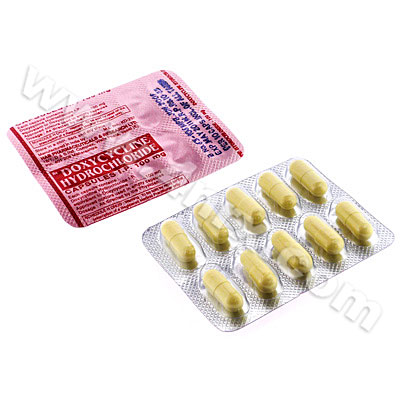 |
Home  Infection Infection  Doxycycline (Doxycycline HCL) Doxycycline (Doxycycline HCL) |
|
|||||||||
|
Doxycycline (Doxycycline HCL)
What is Doxycycline (Doxycycline HCL) used for? Doxycycline (Doxycycline HCL) is a tetracycline antibiotic given as a treatment for bacterial infections, such as respiratory tract infections, infections causing acne, skin infections, Lyme disease, infections of the genitals as well as many other infections. Patients who have been exposed to anthrax may be given this drug, and it may also be used to prevent malaria infection. How should I use Doxycycline (Doxycycline HCL)? Doxycycline (Doxycycline HCL) comes in the form of capsules, which should be swallowed whole with a glass of water. You may be directed to take it 1 to 2 times per day, however the dosage may vary for each patient depending on the condition being treated. Taking it with food can reduce the risk of a stomach upset, however it may also decrease the amount of the drug absorbed. You should discuss the best way to take it with your physician. If you are travelling to an area affected by malaria and using this medication to prevent malaria infection, you need to be aware of the proper dosage requirements. To prevent malaria, you will normally need to start taking this drug prior to travelling, and continue taking it for the entire period for which you are away, and for a period of time after you return. Discuss the dosage and length of treatment required with your physician. What are the side effects of Doxycycline (Doxycycline HCL)? Common side effects of Doxycycline (Doxycycline HCL) include:
Patients should be aware that this drug may also cause more serious side effects. You should consult your physician if you notice blurred vision, appetite loss or a decrease in urination. Please Note Strictly follow all instructions provided to you by your physician or pharmacist while using Doxycycline (Doxycycline HCL). Optimum and safe dosage can differ based on the patient and the condition being treated. As this medication may be unsafe for certain patients, it is essential you always inform your physician if you are pregnant or breastfeeding, as well as if you have any allergies, other illnesses, or ongoing health conditions, and if you are taking any other form of medication, supplements, or herbal products. Immediately seek emergency medical care if you have any allergic or hypersensitive reaction. Common signs of a reaction include hives, swelling, skin rashes, chest pains, as well as trouble breathing or swallowing. 
|
|||||||||||||||||